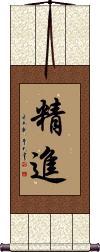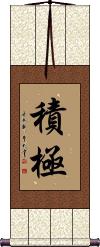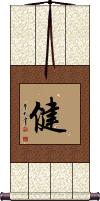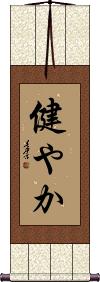Many custom options...
And formats...

Vigorous in Chinese / Japanese...
Buy a Vigorous calligraphy wall scroll here!
Personalize your custom “Vigorous” project by clicking the button next to your favorite “Vigorous” title below...
1. Old, But More Vigorous in Spirit
2. Devotion / Diligence / Vigorous / Energetic
Old, But More Vigorous in Spirit
Age is just a number
老當益壯 is a Chinese proverb that means “old but vigorous” or “hale and hearty despite the years.”
Said of someone who is more spirited when he/she grows older.
The story behind this Chinese proverb:
In the Eastern Han Dynasty, there was a man named Ma Yuan. He had been planning to herd animals on the frontier since he was young. When he grew up, Ma became a minor official of a county.
Once, he was sending some prisoners to another location. He felt pity for them, so he set them free, and then he fled to another county in the north. He herded animals there, and thus his dream came true. He always said: “If you want to be a great man, the poorer you are, the firmer in spirit you have to be; the older you are, the more spirited you should be.”
Later, when he was even older, Ma Yuan became a famous general of the Eastern Han Dynasty and contributed to many battles.
Devotion / Diligence / Vigorous / Energetic
vīrya
精進 is a wide-ranging word that is used in Chinese, Japanese, and Korean.
It can mean devotion, diligence, concentration, aggressive, enterprising, vigorous, energetic, purification, pushing, asceticism, assiduity, or virility. 精進 is deep, and these two characters can express ideas that take a full English phrase to describe, such as “concentration of mind,” “to forge ahead vigorously,” or “to dedicate oneself to progress.”
Used in the context of Buddhism, it means “making earnest efforts to cultivate virtue and get rid of evil” or “zeal in one's quest for enlightenment.”
Initiative / Proactive / Positive
This word closely matches the way initiative is often used in English. This word can also mean active, energetic, vigorous, positive (outlook), or proactive in Chinese.
The meaning also includes positive and progressive in Japanese and Korean.
Strong / Healthy
This “strong” character is the more “healthy” version of strong. 健 is the “strong” that is appropriate for an athlete.
Beyond “healthy,” it can also mean strength, persistence, vigorous, or invigorated/invigoration.
Strong / Healthy
健やか is a verbose way to say strong and healthy in Japanese. 健やか is the “strong” that is appropriate for an athlete.
Beyond “healthy,” it can also mean strength, persistence, vigorous, or invigoration.
Japanese also use the first Kanji to mean the same thing. This version adds two hiragana which serve to emphasize or amplify the word and clarify the meaning.
Note: Because this selection contains some special Japanese Hiragana characters, it should be written by a Japanese calligrapher.
Engage with Confidence
理直氣壯 is a Chinese proverb that means “to do something while knowing you’re in the right.”
This can also be translated as and is appropriate when you are:
“In the right and self-confident”
“Bold and confident with justice on one's side”
“Having the courage of one's convictions”
“Justified and forceful”
“To be confident and vigorous because reason and logic are on one's side”
“Justified and confident”
Rise and Fall / Ups and Downs
Eiko-Seisui
This Japanese proverb can be translated as “flourish and wither, prosper and perish,” “life is full of fortune and misfortune,” or simply “vicissitudes of life.”
栄枯盛衰 / 榮枯盛衰 is about the rise and fall of human affairs or the ups and downs of life. Prosperity comes and goes, everything is fleeting and temporary, but like waves, another swell of prosperity may come.
Here's how the Kanji break down in this proverb:
栄 = prosper; thrive; flourish; boom.
枯 = wither; die.
盛 = prosperous; flourishing; thriving; successful; energetic; vigorous; enthusiastic.
衰 = become weaker; decline; get weak; die down; subside; abate; fail.
![]() Notes: The original version of the first character looks like the image to the right. In modern Japan, they simplified that Kanji a bit into the version shown above. If you have a preference for which style is used for your calligraphy, please let me know when you place your order.
Notes: The original version of the first character looks like the image to the right. In modern Japan, they simplified that Kanji a bit into the version shown above. If you have a preference for which style is used for your calligraphy, please let me know when you place your order.
Apparently, with that original version of the first character, this is also used in Korean Hanja. However, I have not confirmed that
it’s
used in the same way or is widely-known in Korean.
These search terms might be related to Vigorous:
Devotion / Diligence / Vigorous / Energetic
Dynamic
Dynamic Energy / Enthusiasm
Fierce and Courageous Training Defeats the Strong and Protects the Body.
Firm Belief / Strong Faith
Live Strong
Mighty / Powerful / Strong
Stay Strong / Indestructible / Unbreakable
Stay Strong / Iron Will
Strength: Strong and Solid
Strong / Healthy
Strong / Powerful
Strong / Powerful / Force
Strong / Robust
Strong and Beautiful
Strong Body, Strong Mind
Strong Bones Come From Hard Knocks
Strong Hearted / Strong Willed
Strong Mind Strong Body
Strong Minded
Strong Willed
Strong Woman
Strong-Minded Woman
Strong-Willed / Strong of Heart
Tempering Makes Strong Steel
The Strong One
The Weak Are Meat, the Strong Eat
Woman of Strong Character / Woman Hero
Not the results for vigorous that you were looking for?
Below are some entries from our dictionary that may match your vigorous search...
| Characters If shown, 2nd row is Simp. Chinese |
Pronunciation Romanization |
Simple Dictionary Definition |
元気 see styles |
motoki もとき |
More info & calligraphy: Stamina / Vigor |
盛大 see styles |
shèng dà sheng4 da4 sheng ta seidai / sedai せいだい |
More info & calligraphy: Shanda(noun or adjectival noun) (1) grand; magnificent; lavish; large scale; prosperous; thriving; lively; (noun or adjectival noun) (2) forceful; powerful; vigorous; (given name) Seidai |
積極 积极 see styles |
jī jí ji1 ji2 chi chi sekkyoku(p); shakkyoku せっきょく(P); しゃっきょく |
More info & calligraphy: Initiative / Proactive / Positive(can act as adjective) (ant: 消極・しょうきょく・1) active; positive; progressive |
健やか see styles |
sukoyaka すこやか |
More info & calligraphy: Strong / Healthy |
老當益壯 老当益壮 see styles |
lǎo dāng yì zhuàng lao3 dang1 yi4 zhuang4 lao tang i chuang |
More info & calligraphy: Old, But More Vigorous in Spirit |
奡 see styles |
ào ao4 ao |
haughty; vigorous |
怒 see styles |
nù nu4 nu ikari いかり |
anger; fury; flourishing; vigorous (surname) Ikari to become angry |
敃 see styles |
mǐn min3 min |
strong; robust; vigorous |
燊 see styles |
shēn shen1 shen |
brisk; vigorous (of fire) |
盛 see styles |
shèng sheng4 sheng yoshi よし |
flourishing; vigorous; magnificent; extensively (n,n-suf,ctr) (1) serving (of food); helping; (2) (abbreviation) chilled soba served on a dish (often on a wicker basket or in a shallow steaming basket) with dipping sauce; (given name) Yoshi abundant |
矜 see styles |
jīn jin1 chin kō |
to boast; to esteem; to sympathize To pity; boast; attend to; vigorous. |
茁 see styles |
zhuó zhuo2 cho |
to display vigorous, new growth; to sprout |
衝 冲 see styles |
chòng chong4 ch`ung chung katsuhiro かつひろ |
powerful; vigorous; pungent; towards; in view of (1) important point (e.g. on a route); (2) important role (responsibility, etc.); (3) {astron} (See 合・ごう・4) opposition; (personal name) Katsuhiro |
遒 see styles |
qiú qiu2 ch`iu chiu takashi たかし |
strong; vigorous; robust; to draw near; to come to an end (personal name) Takashi |
健旺 see styles |
jiàn wàng jian4 wang4 chien wang |
robust; healthy; vigorous; energetic |
剛勁 刚劲 see styles |
gāng jìng gang1 jing4 kang ching |
bold; vigorous |
勁舞 劲舞 see styles |
jìng wǔ jing4 wu3 ching wu |
to dance energetically; vigorous modern style of dance |
勃勃 see styles |
bó bó bo2 bo2 po po botsubotsu ぼつぼつ |
thriving; vigorous; exuberant (adj-t,adv-to) spirited; rising; energetic |
奮發 奋发 see styles |
fèn fā fen4 fa1 fen fa funhotsu |
to rouse to vigorous action; energetic mood undertaking |
彭湃 see styles |
houhai / hohai ほうはい |
(adj-t,adv-to) (1) as the sound of surging water; (2) vigorous; surging; welling |
旺盛 see styles |
wàng shèng wang4 sheng4 wang sheng ousei / ose おうせい |
vigorous; exuberant (noun or adjectival noun) (1) lively; vigorous; energetic; healthy; avid (e.g. desire); rich (e.g. imagination); (n-suf,adj-na) (2) full of (energy, appetite, curiosity, etc.); brimming with |
昂奮 昂奋 see styles |
áng fèn ang2 fen4 ang fen koufun / kofun こうふん |
buoyant; high-spirited; vigorous (noun/participle) excitement; stimulation; agitation; arousal |
有力 see styles |
yǒu lì you3 li4 yu li yuuryoku / yuryoku ゆうりょく |
powerful; forceful; vigorous (noun or adjectival noun) (1) (See 有力者) influential; prominent; leading; (noun or adjectival noun) (2) (See 有力候補) strong; powerful; likely; plausible; promising; convincing; substantial possessing power |
有勁 有劲 see styles |
yǒu jìn you3 jin4 yu chin |
vigorous; energetic; interesting; amusing |
氛氳 see styles |
funun ふんうん |
(adjective) (archaism) lively; vigorous |
氤氳 氤氲 see styles |
yīn yūn yin1 yun1 yin yün inun いんうん |
(literary) (of smoke, mist) dense; thick (adjective) (rare) energetic; lively; dynamic; vigorous |
溌剌 see styles |
hatsuratsu はつらつ |
(adj-t,adv-to) (kana only) lively; vigorous; sprightly; vivid |
溌溂 see styles |
hatsuratsu はつらつ |
(adj-t,adv-to) (kana only) lively; vigorous; sprightly; vivid |
滂湃 see styles |
houhai / hohai ほうはい |
(adj-t,adv-to) (1) as the sound of surging water; (2) vigorous; surging; welling |
潑辣 泼辣 see styles |
pō la po1 la5 p`o la po la |
shrewish; pungent; forceful; bold and vigorous |
Click here for more vigorous results from our dictionary
The following table may be helpful for those studying Chinese or Japanese...
| Title | Characters | Romaji (Romanized Japanese) | Various forms of Romanized Chinese | |
| Old, But More Vigorous in Spirit | 老當益壯 老当益壮 | lǎo dāng yì zhuàng lao3 dang1 yi4 zhuang4 lao dang yi zhuang laodangyizhuang | lao tang i chuang laotangichuang |
|
| Devotion Diligence Vigorous Energetic | 精進 精进 | shoujin / shojin | jīng jìn / jing1 jin4 / jing jin / jingjin | ching chin / chingchin |
| Initiative Proactive Positive | 積極 积极 | sekkyoku / sekyoku | jī jí / ji1 ji2 / ji ji / jiji | chi chi / chichi |
| Strong Healthy | 健 | ken | jiàn / jian4 / jian | chien |
| Strong Healthy | 健やか | sukoyaka | ||
| Engage with Confidence | 理直氣壯 理直气壮 | lǐ zhí qì zhuàng li3 zhi2 qi4 zhuang4 li zhi qi zhuang lizhiqizhuang | li chih ch`i chuang lichihchichuang li chih chi chuang |
|
| Rise and Fall Ups and Downs | 栄枯盛衰 / 榮枯盛衰 荣枯盛衰 | ei ko sei sui eikoseisui | ||
| In some entries above you will see that characters have different versions above and below a line. In these cases, the characters above the line are Traditional Chinese, while the ones below are Simplified Chinese. | ||||
Successful Chinese Character and Japanese Kanji calligraphy searches within the last few hours...










